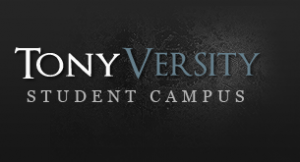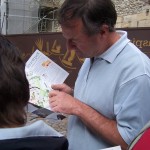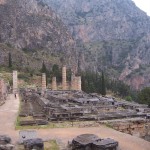Block 5. Website Analysis
Now we’re going to do some analysis of web content ….
….with the help of 4 London Museums.
Why this image – it is a sort of ‘open air museum‘… in Greece …. anybody get it? [Delphi]
-
The Science Museum at http://www.sciencemuseum.org.uk/
-
The Natural History Museum at http://www.nhm.ac.uk/
-
The Victoria and Albert Museum at http://www.vam.ac.uk/
-
The British Museum at http://www.britishmuseum.org/
Your (individual) Task:
- The first stage of your task is to have a look at all of these websites and choose one of the museums that appeals to you. NB. It is NOT quite a free choice in the sense that I need broadly equal numbers of you to choose the same website then to work on it individually: the same number for the British Museum, the same for the V&A etc. That is important as each of the discussions we will eventully hold requires that we have four people: one covering each of the four museums.
- then address EACH (i.e. ALL) of the following 5 questions systematically and analytically to your chosen museum website. You should take notes in English in preparation for a discussion with your colleagues who will have been studying other sites: we will compare and contrast our evaluations….
Here are the questions you must address (i.e. apply to your chosen Museum’s website):
 1. DISABILITY. If you or someone in your family happens to be disabled or has special needs, does the website give sufficient information to enable you to go ahead and plan a visit with confidence? [TIP: remember there are various forms of ‘disability’ – most people always seem to have in mind a picture of someone in a wheelchair when they think ‘disabled’…. but it is far more than that: potential visitors may be: blind / poorly-sighted, deaf /hard of hearing or dumb for instance. ‘special needs’ may involve those who are particularly aged, pregnant or perhaps with babies/very young children etc….]
1. DISABILITY. If you or someone in your family happens to be disabled or has special needs, does the website give sufficient information to enable you to go ahead and plan a visit with confidence? [TIP: remember there are various forms of ‘disability’ – most people always seem to have in mind a picture of someone in a wheelchair when they think ‘disabled’…. but it is far more than that: potential visitors may be: blind / poorly-sighted, deaf /hard of hearing or dumb for instance. ‘special needs’ may involve those who are particularly aged, pregnant or perhaps with babies/very young children etc….]
 2. TEACHER & STUDENT GROUP NEEDS. [The photo is of the best teacher I have ever encountered anywhere: he taught me, and late in his career I had the pleasure of teaching alongside him].
2. TEACHER & STUDENT GROUP NEEDS. [The photo is of the best teacher I have ever encountered anywhere: he taught me, and late in his career I had the pleasure of teaching alongside him].
If you are a teacher considering a Museum visit with a group of 7-11 year old children to ‘bring alive’ particular aspects of the UK Education National Curriculum ‘Key Stage 2’ in History, Science, Art or Technology, say, does the website suggest that a museum visit might be particularly beneficial? [TIP: consider the sort of things which may be of concern to teachers in this situation -and NOTE: this list is NOT exhaustive – think up other issues which might occur to you too were you a teacher:
- what sort of group sizes can they cater for?
- will the kids be safe / what happens if they get ‘lost’
- are there meeting rooms available where we can gather together / hold a mini-class / have lunch?
- can ‘experts’ / museum staff be called upon to help/contribute/guide/teach?
- how do I find out which parts of the exhibitions might relate to the part of the National Curriculum being studied?
- will the children be able to interact with and understand the exhibits? [Lengthy / wordy interpretational panels on exhibits written for adults will not work – they would be at too high a level for them to understand and would not meet their attention-span requirements?]
- are there any special exhibitions/events for children?
- does the museum produce materials we can work on in class BEFORE and AFTER the visit AND materials for them to use and enjoy DURING the visit?]
 3. RESEARCH PORTAL. If you are a student working at Master’s thesis level or are a PhD researcher or Doc/Arch/Mus specialist, are there ‘gateways’ in the website to enable you to access / find out how to access further layers of resources, knowledge and expertise that perhaps lie ‘deeper’ within the museum and are not available to the typical tourist visitor? Is the Museum evidently operating at a level beyond that of the day/tourist visitor?
3. RESEARCH PORTAL. If you are a student working at Master’s thesis level or are a PhD researcher or Doc/Arch/Mus specialist, are there ‘gateways’ in the website to enable you to access / find out how to access further layers of resources, knowledge and expertise that perhaps lie ‘deeper’ within the museum and are not available to the typical tourist visitor? Is the Museum evidently operating at a level beyond that of the day/tourist visitor?
.
 4. STICKABILITY. To what extent do you consider the website to demonstrate ‘stickability’ [i.e. the website is attractively designed and works effectively to engage interest such that the website visitor stays on-site longer (than he might otherwise), drills down deeper into the content and is more likely to come back more frequently. In the Museums’ context this might also mean increased opportunity to deliver learning, to sell goods and services, to stimulate re-visit to the museum itself and increase postive word of mouth recommendation: i.e. to achieve its objectives]. I realise that my site isn’t the most ‘stickable’ in the world!!
4. STICKABILITY. To what extent do you consider the website to demonstrate ‘stickability’ [i.e. the website is attractively designed and works effectively to engage interest such that the website visitor stays on-site longer (than he might otherwise), drills down deeper into the content and is more likely to come back more frequently. In the Museums’ context this might also mean increased opportunity to deliver learning, to sell goods and services, to stimulate re-visit to the museum itself and increase postive word of mouth recommendation: i.e. to achieve its objectives]. I realise that my site isn’t the most ‘stickable’ in the world!!
.
 5. LANGUAGES? What if you are a potential visitor [my French neighbour at the Tower of London] or researcher who speaks another language: just how much content is there for you in your native tongue?
5. LANGUAGES? What if you are a potential visitor [my French neighbour at the Tower of London] or researcher who speaks another language: just how much content is there for you in your native tongue?
Perhpas it is unreasonable for all languages to be offered: but the principal ones, perhaps? It may be likewise unreasonable to expect all content to be translated throughout all levels of the site, but how far does the website go in this respect… and is it extensive enough for an internationally renowned museum in a capital city? [For example if you were an Italian family connecting to the site from their London hotel room…. would they be able to find what they need in their mother tongue?]
THEN….
PART ONE: participation in a discussion
Once you have finished your individual analyses of your chosen site, I will match you with three of your colleagues who have focused on the other sites with a view to you comparing and contrasting your sites under the five headings above and identifying where sites can learn from the others.
I will then set up 6 ‘round tables‘ (for four people who have studied different museums’ websites) to compare and contrast in a discussion your respective evaluations in response to questions I will pose: and all in your very best English. You may bring your notes to the session as an aide mémoire, but you really must talk naturally and discuss rather than read a pre-prepared script.
With six x 4-person discussions, we should be able to do this in just one week if we limit the discussions to 15 minutes each. Then after these discussions have taken place, we will consider the outcomes of your research together….
Structure for PRODUCTION in this Block
- First week. I set up the project with you and you can have the rest of the class to familiarise yourself with the task and ‘surf’ the four websites with my help and clarification as necessary
- Second. You research: analyse and evaluate
- Following week. Discussions. ASSESSED
- Following week. PART TWO. Team based production of letters containing your recommendations to the Directors of each of the Museums for improvements they might consider putting into action based upon your research. NB. You might even suggest that you / your course could help in this regard [placements / ‘stages‘ (Fr)].
- I might also hold a plenary session for you to compare and contrast these London-based National Museums practices with those of their French equivalents – maybe there are lessons to be learned in BOTH directions!
- Christmas / New Year Holidays!!
[An ‘Aside’ ]
Staying in London on the cheap
…well….. relatively-speaking!
For information, it IS possible to ‘do‘ London relatively cheaply – well it was before CoVid, and I suspect post CoVid prices will drop considerably initially to attract tourists back… For example, were you wanting to stay right in the very heart of London, right next to these museums (so close, in fact that you would not even need to use the Tube / Metro) there is an Astor Hostel (Hyde Park) where you can stay for as little as £20 per night (off season sharing a dormitory with 10 or more others) or 25-30£ sharing a double private room. There are also large, modern, well-equipped kitchens in the Hostel so you can cook for yourselves quite cheaply rather than eat in expensive restaurants and risk English Food!!!. No, I’m not on commission…. but we have taken students (and staff!) to stay there in the past when visiting London. Match that with a Low-Cost flight and you could well have a long weekend visiting these free national museums for as little as 150Euros…. Worth thinking about, perhaps….. Then you could test your own analysis! And no… I am not an Astor Hostels’ share-holder!!! T.


